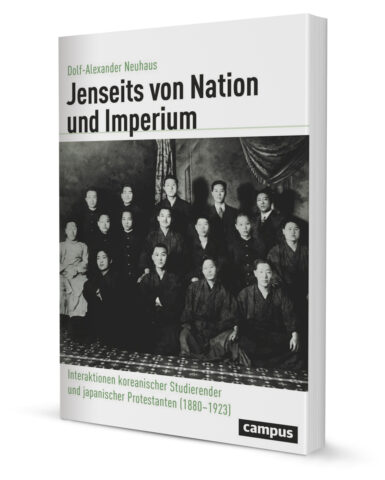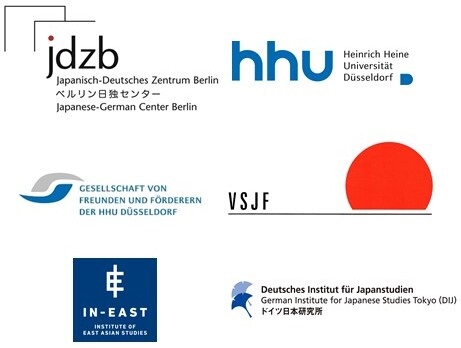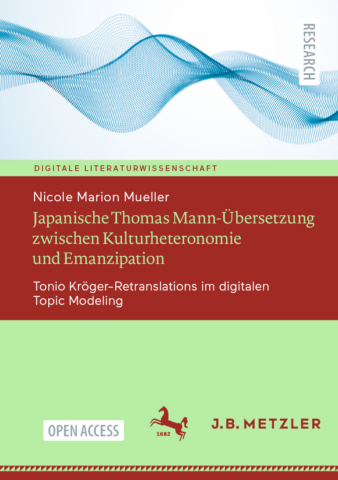イベント&アクティビティ
Book by Dolf Neuhaus on Korean-Japanese Interactions and Japanese Colonial Rule in Korea

What role did Korean students who came to Japan between 1880 and 1923 play in the discourse on Japan’s colonial and East Asian policies? How did their encounter with Japanese intellectuals of Protestant faith, especially in the environment of the YMCA and the Imperial University of Tokyo, influence their views? Drawing on a wide range of Japanese and Korean sources, Dolf-Alexander Neuhaus‘ new book Jenseits von Nation und Imperium. Interaktionen koreanischer Studierender und japanischer Protestanten (1880–1923) (Beyond nation and empire. Interactions between Korean students and Japanese Protestants, 1880-1923) examines how these students and intellectuals discussed Japanese colonial rule in Korea and the ‘Korean question’ and how their exchange of ideas influenced Japanese and Korean perceptions of empire, nation, and East Asia. The book is based on Dolf’s doctoral dissertation and is published by Campus in the Global History series.
Hybrid DIJ Study Group on Looting of Post-Surrender Japan

Following the American conquest of Okinawa in June 1945, the Japanese military anticipated that the Allies planned to invade the four main islands of Japan. But to everyone’s surprise, no such invasion came. Instead, the war abruptly ended on August 15, 1945, without a single Allied soldier setting foot on mainland Japan. Between August 15 and late September 1945, morale and discipline within military units across Japan underwent a wholesale collapse. This talk explores how soldiers and sailors within Japan reacted to defeat during the critical weeks after Japan’s surrender. Using data from Japanese military police (Kenpeitai) reports, the talk argues that looting by demobilized servicemen and their officers profoundly tarnished the Japanese military’s reputation in the eyes of the public and severed what few bonds remained between the Imperial Japanese military and Japan’s people. Details and registration here
DIJ co-organises VSJF Annual Conference on Sustainability in Japan
 Making human activity on Earth sustainable is currently the greatest challenge of mankind. Ever since the United Nations adopted the Sustainable Development Goals (SDGs) in 2015, the topic has gained world-wide popularity, but what sustainability means, how it can be achieved, how it is politically negotiated, and which actors are involved differs widely across the world. Focusing on economic, societal, and political perspectives, the purpose of this conference is to gain a better understanding of how issues of sustainability are understood, framed and pursued by different actors in Japan. Speakers include DIJ researchers Franz Waldenberger, Barbara Holthus, Isaac Gagné, Sebastian Polak-Rottmann, and Nicole M. Mueller. The conference is co-organised by Barbara Holthus and DIJ alumni Harald Conrad (Düsseldorf) and Axel Klein (Duisburg). It takes places at the JDZB in Berlin from November 15-17, 2024. Details and registration here
Making human activity on Earth sustainable is currently the greatest challenge of mankind. Ever since the United Nations adopted the Sustainable Development Goals (SDGs) in 2015, the topic has gained world-wide popularity, but what sustainability means, how it can be achieved, how it is politically negotiated, and which actors are involved differs widely across the world. Focusing on economic, societal, and political perspectives, the purpose of this conference is to gain a better understanding of how issues of sustainability are understood, framed and pursued by different actors in Japan. Speakers include DIJ researchers Franz Waldenberger, Barbara Holthus, Isaac Gagné, Sebastian Polak-Rottmann, and Nicole M. Mueller. The conference is co-organised by Barbara Holthus and DIJ alumni Harald Conrad (Düsseldorf) and Axel Klein (Duisburg). It takes places at the JDZB in Berlin from November 15-17, 2024. Details and registration here
Hybrid DIJ Forum on ‘Omnilateralism in an Interpopular World’
 After a century of Western-inspired and hackneyed multilateralism, its much criticized more than 75-year-old stronghold, the UN, needs a new narrative: interpopular omnilateralism. Instead of originating in the hardly definable construct of the “nation” and hence being “international”, the UN Charter is rather based on the people, thus it is interpopular from its inception. The proper vehicle to reach this aim of a wider community of people is omnibus – for and by all -, firstly, to widen the way for input of more ideas and good practices by non-Western people, and secondly, to include non-state actors as legitimate stakeholders in global governance. At this DIJ Forum, Wolfgang Pape will introduce the concept omnilateralism and discuss it in the context of democracy and global governance. Akio Kawato will offer his comments, followed by a Q&A session and a small reception. Details and registration here
After a century of Western-inspired and hackneyed multilateralism, its much criticized more than 75-year-old stronghold, the UN, needs a new narrative: interpopular omnilateralism. Instead of originating in the hardly definable construct of the “nation” and hence being “international”, the UN Charter is rather based on the people, thus it is interpopular from its inception. The proper vehicle to reach this aim of a wider community of people is omnibus – for and by all -, firstly, to widen the way for input of more ideas and good practices by non-Western people, and secondly, to include non-state actors as legitimate stakeholders in global governance. At this DIJ Forum, Wolfgang Pape will introduce the concept omnilateralism and discuss it in the context of democracy and global governance. Akio Kawato will offer his comments, followed by a Q&A session and a small reception. Details and registration here
Onsite DIJ Panel Discussion on Migrants’ Histories
 This panel discussion explores the relationship between migration and knowledge production, emphasizing the role of migrants as transmitters and producers of new knowledge. Using historical case studies, Simone Lässig challenges the binary of assimilation and conflict by showing how immigrants in the 19th and 20th centuries acted as cultural translators, shaping both their own communities and host societies. Intersecting the history of migration with the history of knowledge, the talk offers insights into the dynamics of migration and reveals the ways in which migrants contribute to global knowledge flows. Mariko Iijima will add a Japanese perspective on the approach based on her own research on the Japanese diaspora. Details and registration here
This panel discussion explores the relationship between migration and knowledge production, emphasizing the role of migrants as transmitters and producers of new knowledge. Using historical case studies, Simone Lässig challenges the binary of assimilation and conflict by showing how immigrants in the 19th and 20th centuries acted as cultural translators, shaping both their own communities and host societies. Intersecting the history of migration with the history of knowledge, the talk offers insights into the dynamics of migration and reveals the ways in which migrants contribute to global knowledge flows. Mariko Iijima will add a Japanese perspective on the approach based on her own research on the Japanese diaspora. Details and registration here
International Workshop ‘Imagined Futures in Japan & Beyond’ at DIJ
 The future begins with imagination. One example are the Sci-Fi prototyping initiatives of Japanese tech giants like Sony and NTT, which intentionally utilize storytelling to foster public acceptance of emerging technologies. Focusing on the connection between narratives, culture, technological innovation, and marketing, this interdisciplinary workshop delves into both fictional and non-fictional portrayals of Japan’s technological future. Twenty international scholars and practitioners from Japan’s tech industry will join us to analyze visions of emerging technologies, of their environmental and societal impact, and of Japan as a “futuristic” nation through the lens of “narrative” and “sociotechnical imaginary” theoretical frameworks. The workshop is organised by DIJ researcher Nicole M. Mueller and supported by the German Center for Research and Innovation (DWIH) Tokyo. It will open with a public DIJ Forum with keynotes by Fritz Breithaupt (Indiana University Bloomington) and Hirotaka Osawa (Keio University). Details and registration here
The future begins with imagination. One example are the Sci-Fi prototyping initiatives of Japanese tech giants like Sony and NTT, which intentionally utilize storytelling to foster public acceptance of emerging technologies. Focusing on the connection between narratives, culture, technological innovation, and marketing, this interdisciplinary workshop delves into both fictional and non-fictional portrayals of Japan’s technological future. Twenty international scholars and practitioners from Japan’s tech industry will join us to analyze visions of emerging technologies, of their environmental and societal impact, and of Japan as a “futuristic” nation through the lens of “narrative” and “sociotechnical imaginary” theoretical frameworks. The workshop is organised by DIJ researcher Nicole M. Mueller and supported by the German Center for Research and Innovation (DWIH) Tokyo. It will open with a public DIJ Forum with keynotes by Fritz Breithaupt (Indiana University Bloomington) and Hirotaka Osawa (Keio University). Details and registration here
Celia Spoden to give keynote at Japan-Germany science and technology cooperation anniversary event

Upon invitation by the Federal Minister of Education and Research, DIJ principal researcher Celia Spoden will give a keynote speech at the anniversary event to celebrate 50 years of science and technology cooperation between Japan and Germany. Drawing on her research project on Cyber-physical spaces and avatar technologies: new opportunities for an inclusive society? she will explain ‘Why Technology Development Needs the Social Sciences: Opportunities and Risks of Avatar Robots’. The event takes place in Kyoto on October 6 and will be attended by leading representatives from both countries’ ministries, research and funding organisations. The two other keynotes will be given by the president of the German Research Foundation (DFG), Katja Becker, and by Ishiguro Hiroshi (Intelligent Robotics Laboratory, Osaka University), a leading Japanese roboticist and engineer.
Open access book by Nicole M. Mueller studies Japanese Thomas Mann translations

In her new book Japanische Thomas Mann-Übersetzung zwischen Kulturheteronomie und Emanzipation: Tonio Kröger-Retranslations im digitalen Topic Modeling (Japanese Thomas Mann translation between Cultural Heteronomy and Emancipation: Digital Topic Modeling of Tonio Kröger Retranslations), DIJ researcher Nicole Marion Mueller uses innovative digital methods to study Japanese translation pluralism in the 20th century. Focusing on Japanese translations of Mann’s novel Tonio Kröger, she retraces the intensive reception of Mann’s literary works in Japan while paying special attention to the interrelations between translation and a variety of historical contexts and actors – most prominently the elitist kyoyoshugi movement rooted in Japan’s prewar education system. Nicole combines this extensive research work with a topic modeling-based mixed methods approach, which enables her to reveal the previously hidden interactions between the re-translated texts as well as patterns of influence and distinction spanning decades of translation history. The book is published by J.B. Metzler in the Digital Literary Studies series and available open access.












 Open Access
Open Access
